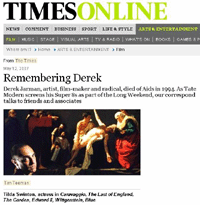 Remembering
Derek: Remembering
Derek: Derek
Jarman, artist, film-maker and radical, died of
Aids in 1994. As Tate Modern screens his Super 8s
as part of the Long Weekend, our correspondent
talks to friends and associates.
Toyah Willcox, singer
and actress in Jubilee and The
Tempest
The actor Ian Charleson
introduced me to Derek. He thought we were
kindred spirits. Every generation has its
oddballs and Derek and I were oddballs in the
1970s. He was an absolute radical in every way
– artistic, sexual and political. When I met
him at his flat in 1977, the first thing that
surprised me was that every man in his flat was
naked. I didn’t really know what
homosexuality was, but he was living with a very
beautiful boy, Yves, and there were two other
boys in the shadows. We had tea. Derek asked me
to look at a script under the sofa, which was for
Jubilee. I took the part that had the most lines.
In the early days he filmed all of us on Super
8.
He called me after giving
me the part in Jubilee to tell me there
wasn’t enough money and my part had to be
cut. I was absolutely f***ing devastated and he
must have heard it in my voice because he put me
back in and I strongly suspect he didn’t
take his own fee for the film as a
result.
In my very first scene I
had to jump into bed with Ian and another actor,
Karl Johnson. I pulled back the sheet and they
were both naked. I gawped. Derek shouted,
“What’s wrong?” I asked whether it
was really necessary that they were naked. He
thought it was funny I had never seen male
genitalia up to that point. After Jubilee, I was
on benefits, a struggling actress, and once a
week he would make me a lovely meal –
mushroom soup and bread.
Next I played Miranda in
his Tempest. He had such a wealth of knowledge.
If Jubilee had been all about the egos and a bit
like working in Warhol’s Factory, this was
much more Derek as a serious film-maker. He would
rarely lose his temper. He might shout: “If
I can fing do this, you can fing do this.”
Then it was over.
When I became a pop star a
few people were keen to see me fail. Not Derek.
He was always supportive. It was hard to keep in
touch but Derek and I exchanged Christmas cards.
His were always embossed with lovely drawings.
Because he was always such an eloquent gentleman
it was amazing to see those angry canvases he
painted about dying and prejudice before he died.
They affected me hugely: they conveyed the way
people with a terminal illness must feel. I was
desperate to see him but Keith, his partner at
the end, said it wasn’t possible and I
respected that. The one memory I really treasure
of Derek is laughter. Laughter was etched on his
face all the time.
The Times
12th May 2007
|